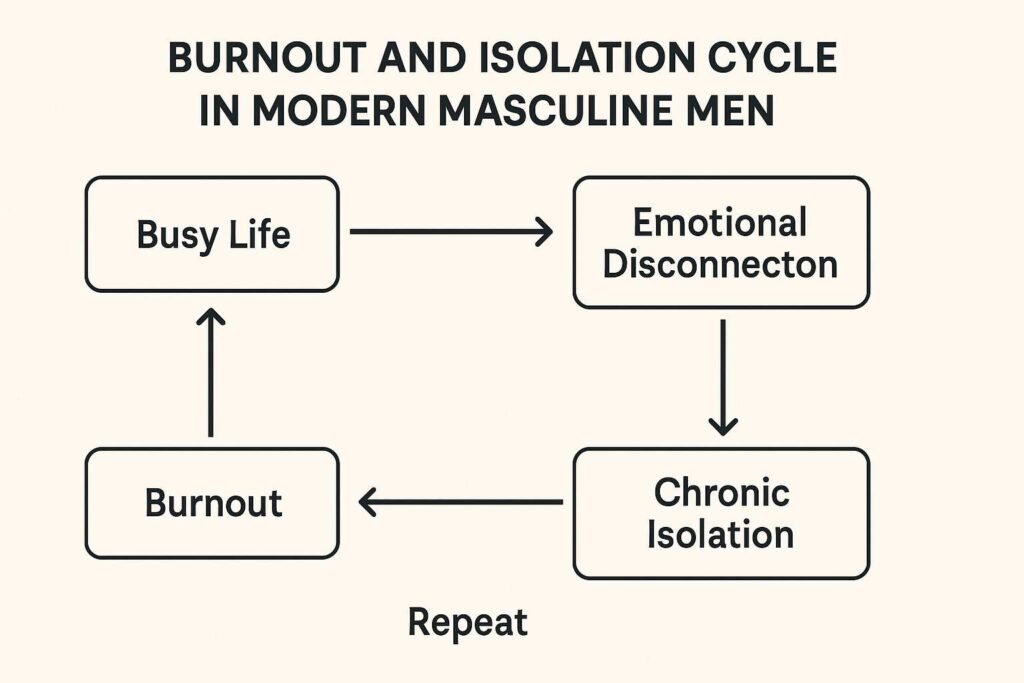Introduction: The Silent Struggle No One Talks About
Men Feel Isolated, let’s get real: the “strong, silent type” might be great in movies, but in real life, it’s a recipe for slow, quiet burnout. Most men won’t say it out loud, not in the locker room, not over beers, and definitely not in the group chat where sarcasm passes for intimacy. But here’s the uncomfortable truth: many men feel profoundly alone. And not the dramatic, Nicholas Sparks kind of loneliness, more like sitting in a room full of people and feeling like a ghost at your own party.
If you’ve ever had that weird moment of thinking, “Why does no one actually see me?”, you’re not being overly sensitive; you’re bumping into a real, overlooked crisis. And it’s not just emotional fluff; it’s structural. In a culture that fetishises the lone wolf and glorifies the grind, male isolation is often disguised as independence. The more “successful” you look, the less you’re allowed to say, “Hey, I actually feel alone.”
Let’s be blunt: the cost of chronic isolation in masculine men, especially the driven, focused, high-achieving types, isn’t just emotional. It kills something primal: clarity, energy, brotherhood, even testosterone. (Yes, prolonged isolation has been linked to hormonal decline and increased stress hormones, go figure.)
In this article, we’ll unpack why this happens, how it creeps in without warning, and what the hell you can do to stop feeling like you’re performing manhood on a one-man stage. This is about more than just male friendship; it’s about reconnection, leadership, and reclaiming your fire.
(And no, we won’t ask you to cry around a campfire, unless that’s your thing. Then cry away, brother.)
Most men won’t say it out loud, not in the locker room, not over beers, and definitely not in the group chat where sarcasm passes for intimacy. But the truth is, many men feel profoundly alone. Not because they lack people around them, but because they feel unseen within those circles.
If you’ve ever sat in a room full of people and felt like no one really gets you, you’re not broken; you’re just overdue for a deeper connection. In a world that praises the “lone wolf,” it’s easy to confuse isolation with independence. But when isolation becomes chronic, it kills something deeper: purpose, drive, clarity.
This article unpacks why most masculine men, especially the driven, disciplined, do-it-yourself types, struggle with loneliness beneath the surface. More importantly, we’ll walk through what to do about it. (No drum circles or trust falls required.)
“reconnect with purpose”
Table of Contents
Why This Matters Right Now

Let’s talk numbers for a second: A recent study from Harvard revealed that 61% of American men report feeling lonely, with that number skyrocketing after age 30. And yet, most men are still told to “man up,” “push through,” or worse, stay busy enough to not feel anything at all.
“A recent study from Harvard revealed that 61% of American men report feeling lonely”
The modern masculine script rewards stoicism but punishes vulnerability. The result? A silent epidemic of disconnected men who look successful on the outside but feel lost on the inside.
This matters because isolated men don’t just suffer quietly; they disengage, they lose purpose, and in worst cases, they break down completely. We don’t need more tough guys pretending. We need more grounded leaders reconnecting.
The Root Problem Most Men Miss

Here’s where it gets a little uncomfortable, but also clarifying.
Most men are running on an outdated operating system: achieve more, feel better. But loneliness doesn’t care how shredded your body is, how fat your bank account looks, or how many unread DMs you have. It’s a soul-level alarm, and no amount of hustle silences it for long.
A lot of men don’t even realise they’re isolated, because they’re busy. Busy is the new emotional Novocaine. We swap intimacy for achievement, connection for competition, and brotherhood for performance. “I’m grinding,” we say, while slowly grinding ourselves down.
The root problem isn’t a lack of people. It’s a lack of presence. It’s having men around you who know your wins, but not your wounds. Who fist-bumps your latest success, but wouldn’t recognise your sadness if it punched them in the face.
The hardest part? Many masculine men are admired by others… and yet profoundly unknown. You become everyone’s go-to for advice, strategy, or stability, but no one’s asked how you’re really doing in months. You’re the lighthouse for everyone else’s storm. But who helps you refuel?
This is the dangerous myth of masculine self-sufficiency. And while it may win you respect, it can quietly rob you of vitality.
You don’t need more productivity. You need more proximity to brothers, to truth, and to spaces where you can just be.
Most men assume that if they just work harder, earn more, or build a better body, the feeling of emptiness will go away. But disconnection isn’t fixed with more productivity. It’s healed with presence, purpose, and aligned brotherhood.

Here’s the kicker: most men have “friends,” but few have mirrors, men who reflect their values, challenge their blind spots, and support their evolution. Instead, we settle for transactional bonds: workout buddies, business allies, or social acquaintances.
What’s missing? Depth. Consistency. The sacred discomfort of being seen and supported without having to perform.
Step-by-Step Framework to Reconnect with Brotherhood
Step 1: Audit Your Current Circle
- Who energises you vs. who drains you?
- Are your current friends aligned with your growth or your stagnation?
- Would you trust these men with your truth, not just your wins?
“audit your current circle”
Step 2: Clarify What Brotherhood Means to You
- Define your values (integrity, purpose, discipline, etc.)
- What type of men do you want to surround yourself with?
- What does support look like for you?
Step 3: Initiate Intentional Male Connection
- Attend men’s groups, masterminds, or retreats.
- Reach out to one man a week for a deeper check-in.
- Suggest doing something together that allows for real talk (hike, training, shared silence)
Step 4: Create a Weekly Ritual for Depth
- Pick a time to reflect, reset, and reconnect, solo or with a brother.
- Use journaling, voice notes, or deep check-in calls.
- Consistency over intensity

Tools and Resources to Help You Connect
- The Mankind Project – Men’s circles that explore emotional maturity and integrity
- “The Mankind Project – Men’s circles that explore emotional maturity”
- Meetup or Eventbrite – For local men’s groups and growth-oriented gatherings
- Books: “King, Warrior, Magician, Lover” by Robert Moore & Douglas Gillette
- Voice Note Accountability – Weekly check-ins with a brother using voice messages
- Journal Prompt Apps – Tools like “JournalFlow” to track emotional patterns
“Journal Prompt Apps – Tools like JournalFlow to track emotional patterns”
Common Mistakes to Avoid
Mistake 1: Expecting Instant Brotherhood
Real connection takes time. Depth grows with repetition, not just chemistry.
Mistake 2: Staying Loyal to Old Circles That No Longer Serve You
Outgrowing friends doesn’t make you arrogant. It means you’re evolving.
Mistake 3: Thinking Solitude Alone Will Heal Everything
Yes, solitude is powerful. But isolation without reflection or connection can become a silent poison.
Bonus Tips for Mastery
- Join or start a monthly “fire circle”, even virtually, where men discuss growth topics.
- Build your own 3-man crew: small, potent, committed.
- Create a ritual around silence and speech: e.g. solo walk on Saturday, deep talk on Sunday.
“why modern men feel disconnected”
FAQ
Q: What if I feel like I’ve outgrown my old friends, but don’t know where to start?
A: Start by getting clear on your current values and seeking out spaces (online or offline) where those values are shared. Growth requires new soil.
Q: Is it weak to admit I feel lonely sometimes?
A: Not at all. In fact, it’s a strength to admit reality and lead yourself through it. That’s masculine courage.
Q: Can online friendships count as brotherhood?
A: Absolutely, as long as they’re rooted in depth, consistency, and shared values. Proximity helps, but it’s not everything.
Q: How do I keep new connections from fading?
A: Ritualise your connection, schedule regular check-ins and don’t wait for “the right moment.” Consistency creates safety.

Conclusion
Loneliness doesn’t mean something is wrong with you. It means something important is ready to be reconnected.
You don’t need 20 friends. You need a few aligned brothers who see you, sharpen you, and stand with you.
So if you’ve been drifting, surviving, or “doing fine”, pause. Look around. Choose to build something deeper.
“brothers who see you, sharpen you, and stand with you”
- Start with one conversation this week.
- Audit your circle.
- Reclaim your right to feel connected, not just surrounded.
Suggested Articles
1. Brotherhood & Solitude: The Masculine Polarity That Builds Leaders
Explore how men need both time alone and strong male circles to become resilient, grounded leaders.
2. How to Find Aligned Male Friends When You’ve Outgrown Your Circle
A practical guide for men looking to rebuild their social circle around values, growth, and shared mission.
3. Modern Brotherhood: Why Masculine Men Need Strong Male Circles
Breaks down the real reasons modern men feel disconnected, and how to rebuild community with intention.
4. The Weekend Solo Ritual That Reconnects Me With Purpose
An inside look at one writer’s ritual to restore clarity and leadership energy through intentional solitude.
5. The Power of Solitude: How Masculine Men Recharge in Silence
Discover the mental and hormonal benefits of structured solitude and why it’s not a weakness but a weapon.


